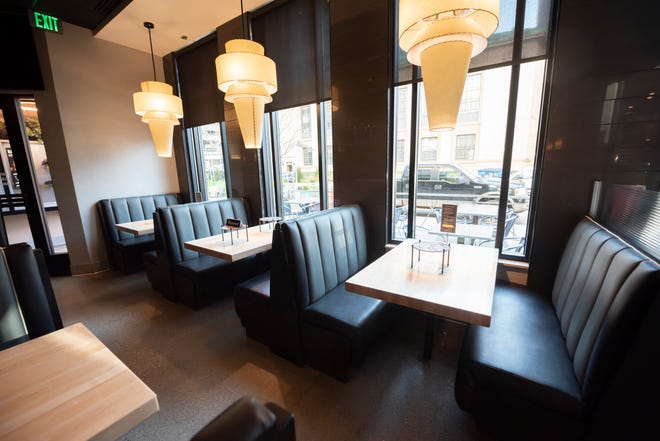Judge again denies restaurant group request to stop Michigan's indoor dining ban
A Grand Rapids federal judge again denied a Michigan restaurant association's request to immediately quash the state's ban on indoor dining as coronavirus cases and hospitalizations remain high statewide.
It's the group's second defeat in its bid to stop the state's restaurant order, and it announced Wednesday it would instead focus on stopping the order from being extended further.

The Michigan Restaurant & Lodging Association and Metro Detroit restaurant chains Heirloom Hospitality Group and Suburban Inns filed suit in Michigan's Western District court last month, arguing an order from state health director Robert Gordon that bans indoor dining through Dec. 8 is unconstitutional and asking the court to immediately put a stop to it.
The same order shuttered high school and college classrooms, indoor bars, movie theaters, group fitness classes, bowling alleys and casinos, and critics worry it could be extended into the New Year.
Judge Paul Maloney, an appointee of Republican President George W. Bush, denied the group's request for a preliminary injunction on Wednesday, ruling the plaintiffs are unlikely to succeed. It's the second such defeat for the restaurant groups, which were denied a request for a temporary restraining order late last month.
"Plaintiffs complain that they are being treated differently than similar businesses, but ... individuals can patronize the businesses that remain open while wearing a mask," Maloney wrote, adding that other food-service businesses that remain open such as food courts and airports are "transitional" and don't foster lingering diners.
Restaurant association president Justin Winslow said in a statement the group is "disappointed" in the ruling and said restaurants have already suffered irreparable harm from the order.
"It is in that vein that we will now transition our efforts to preventing an extension of the MDHHS Order beyond December 8 and call on Director Gordon to provide clear and specific data to justify the sustained closure of restaurants across the state," Winslow said.
"We believe this industry, like any other that has been forced to close, deserves a clear pathway to the full reintegration of their business, with reliable criteria and metrics to be met from Director Gordon to facilitate that reintegration."
Gordon praised the decision in a Wednesday statement, saying the ruling will keep life-saving measures in place.
"The science is settled: public health experts from around the nation and world say these types of actions must be taken to prevent the health care system from being overwhelmed by COVID-19 cases," he said. "These protocols on specific indoor gatherings, along with wearing face masks, social distancing and frequent handwashing, give Michigan a fact-based approach to slow the spread of COVID-19 so we can return to a strong economy and get back to normal safely as soon as we can."
The restaurant group has argued the order from Gov. Gretchen Whitmer's administration violated businesses' right to equal protection under the law, their right to due process, and the clause of the U.S. Constitution that only allows Congress to regulate interstate commerce.
But the group also argued the ban violates provisions of Michigan state law and the Michigan Constitution, including the separation of powers.
These questions, Maloney wrote, should be considered before the federal questions as the case moves forward. The court is considering asking the Michigan Supreme Court to answer them and has scheduled a hearing on Dec. 17 to consider it.
Maloney proposed asking the state Supreme Court to answer whether the state law that Gordon cites as the authority for his orders is an unconstitutional "delegation of legislative authority" and, if not, whether Gordon has the power to issue orders under it.
It's been a crucial question since Whitmer lost her ability to issue emergency orders without the approval of the Legislature and began issuing orders through the state health department instead. Independent legal experts have agreed with the administration that the state health department orders are on solid legal footing.
There have been 373,197 confirmed cases of coronavirus and 9,405 deaths in Michigan since state officials discovered the first cases in March. Hospitalizations and case counts remain high as the state experiences a prolonged second wave of the virus.
Despite this, the owner of the Andiamo restaurant brand, Joe Vicari, urged fellow restaurant owners earlier this week to ignore Gordon's order if the restaurant association's lawsuit is unsuccessful. A group of Michigan physicians penned a letter shortly afterward urging restaurant owners to comply with the order.
"All of us want people to get back to work and businesses to reopen responsibly, but Mr. Vicari’s call to reopen no matter the health risk is reckless," Dr. Ijeoma Nnodim Opara said. "Data and evidence show that restaurants, bars and cafes are places with the highest likelihood for COVID-19 transmissions, and as physicians, we urge these businesses to help reduce infections by following expert scientific advice so we can all do our part to help keep people safer."
The restaurant group argues that around 4.3% of coronavirus outbreaks are linked to restaurants across the state. In a statement Wednesday, they estimated an additional 250,000 restaurant workers will be laid off over the holiday season and around 6,000 more restaurants will close by spring if the indoor dining ban is extended and Congress doesn't approve more aid for businesses.
rbeggin@detroitnews.com
Twitter: @rbeggin